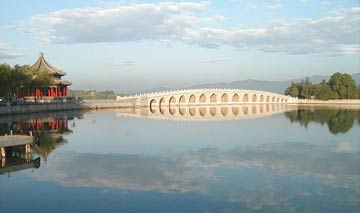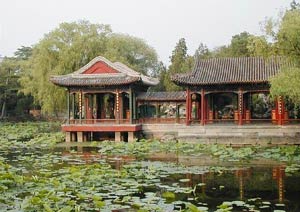China Archives of World Heritage
The Summer Palace cctv.com 07-01-2004 10:44
cctv.com 07-01-2004 10:44
Beijing's Yiheyuan, also known as the Summer Palace, lies in the capital's northwest. It is Beijing's largest Imperial garden, with graceful and serene buildings and cool streams and lakes. It is a popular summer destination for local residents and visitors alike, but they were not always permitted here. The Summer Palace was built as a retreat for the Empress Dowager Cixi, but served a number of other purposes. It was part of the capital's water management system and was intended to give Emperor Qianlong more freedom from his mother's control. The gardens became the stage for some of the most significant events in the time's politics and arts.
|

|
|
|
Empress Dowager Cixi was arguably the most powerful woman China has ever had. Despite accepting residence at the Summer Palace, her effective control of the Qing government continued almost without interruption. All seemed to be arranged for her convenience. The Empress Dowager conducted business in the mornings and indulged in leisure in the afternoons, always within the garden emulating the best and most famous designs of Imperial China.
As in other Imperial residences, such as the mountain resort at Chengde, the architecture of minority nationalities was represented in the Summer Palace. This was in line with the Qing policy of placating these groups. The overall effect of the garden was the universe in miniature. The layout reflected Confucian values, constellations were represented alongside replicas of commercial and agricultural areas. The Empress Dowager could even attend the theatre and watch lavishly staged Beijing Operas, or Jing Ju, without leaving the garden.
|

|
|
|
The Summer Palace is more than a garden, however impressive. It reflects the ideals and lifestyles of the late Qing Dynasty in its design and architecture. Conceits like those of Suzhou Street, with pretend vendors selling to unreal customers, try to show the links between the rulers and the ruled. In the end such play-acting only makes it obvious how detached from the people the Qing rulers actually were. What remains today is a testament to the brilliance and decadence of the old order. It is one last, late flowering of Chinese landscaping and architecture which belongs to the whole world's cultural heritage.
Editor:Wang Source:CCTV.com